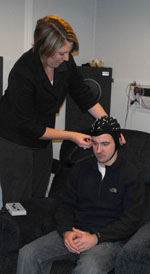Syracuse Views Summer 2025
We want to know how you experience Syracuse University. Take a photo and share it with us. We select photos from a variety of sources. Submit photos of your University experience by sending them directly to Syracuse University News at…

 The three-year study, funded by a $300,000 grant from the National Institutes of Health, will assess how TBI affects the central auditory system. Vander Werff (at left, with a patient) is an associate professor and auditory researcher in the Department of Communication Sciences and Disorders in SU’s
The three-year study, funded by a $300,000 grant from the National Institutes of Health, will assess how TBI affects the central auditory system. Vander Werff (at left, with a patient) is an associate professor and auditory researcher in the Department of Communication Sciences and Disorders in SU’s